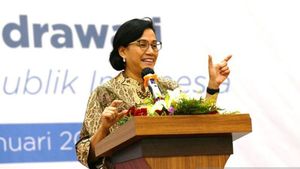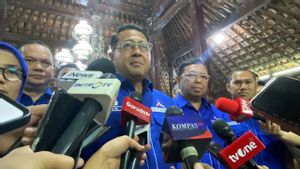JAKARTA - The salary budget and allowances for civil servants (PNS) throughout Indonesia are quite large. Sometimes when it comes to salaries and visits, civil servants often burden the state budget. This condition is exacerbated by the performance of civil servants who are considered unproductive -- so the burden on the state.
All the problems of civil servants reached the ears of Agus Martowardojo. The Minister of Finance (Menkeu) from the 2010-2013 era did not want civil servants to drag on. He tried to raise new ideas. He wants to discuss early retirement to underproductive civil servants.
Work as a civil servant is one of the dream livelihoods of many people. The certainty of salary and pension funds is an attraction. People also think that in the future they can enjoy old age to the maximum as retired civil servants.
The other side of the ideal job makes the government dizzy. No one denies that the number of civil servants is quite high in Indonesia. The regular acceptance of big problems. The presence of many civil servants can burden the government's budget in providing salary benefits, pensions, and insurance.
This fact is not just an empty message. Each government in the reform era has experienced the same thing. Expenditures for salaries and allowances for civil servants are the culprit for many other government programs that are not optimal.
Economic development is limited. There are also many stalled infrastructures. Complaints related to the poor performance of civil servants also often appear. The government only knows how to recruit civil servants. However, the placement and all kinds of things are questions.
Sometimes they fill the right position. Sometimes it's also not right. This condition brings problems: not optimal. The government's program to increase the lives of the Indonesian people is questionable. Instead of bringing Indonesia forward and being frugal, the presence of many civil servants is like a burden on the government.
This condition was carried by Agus Martowardojo. The Minister of Finance from the 2010-2013 era realized that all kinds of problems related to the productivity of civil servants must be addressed. He considered that the government should carry out bureaucratic reform.
"Regarding civil servants, it is necessary to be aware because the number is quite high and the bureaucratic reform program is an initiative that we hope that our civil servant productivity will increase. We want to appeal to regions to always back up the minimum of 20 percent of their APBD for capital expenditures and we know for new areas of expansion, there are many budget allocations for routine and employment. .
"If you are not careful, apart from regarding employee costs, it also relates to old-age allowances, pensions and it will result in institutions such as Taspen, Askes, Asabri which will later experience financial difficulties due to the sudden increase in the number of civil servants and lack of planning," Agus said as quoted by the ANTARA website, June 22, 2011.
Agus also began to find solutions related to the increasing number of civil servants. He began to think about various initiatives related to reducing the number of civil servants. He considered the reduction could make many budgets allocated to more beneficial things for economic growth.
Bureaucratic reform was also rolled out. Agus advanced the idea of early retirement for civil servants from 2011. The discourse of early retirement civil servants has actually been discussed by Agus' predecessor, Sri Mulyani (Menkeu era 2005-2010). However, the discourse did not come to the surface.
Agus also tried to finalize the idea of early retirement. He tried to inflame so that the government could run optimally. Those who will be encouraged to retire will be civil servants who do not work effectively. Agus assessed that he saw for himself the advantages of civil servants from the middle to lower levels.
The discourse of early retirement offered will also be prepared intensively and bonuses. The goal is that more civil servants are willing to voluntarily retire early. The bonuses and incentives provided are still being discussed further.
SEE ALSO:
Later, it will be discussed with the DPR and the Ministry of Administrative Reform and Bureaucratic Reform (Kemenpan RB). Recently, the discourse of early retirement in the style of Agus began to change.
Initially, the discourse was developed for all ministries, then it was only for civil servants of the Ministry of Finance. The application was hampered by many things. Fund matters are the main thing. This condition makes the discourse of early retirement not getting a place in Indonesia. The issue just disappeared.
"The early retirement program is still internal at the Ministry of Finance. At the Ministry of Finance, we are still in the finalization process. We will discuss it with the Minister of Administrative and Bureaucratic Reform for its implementation. The actual form is not in early retirement but is more emphasized in the program to increase HR productivity.
"We know that for the same work, if it can be completed by the right human resources or leaner than the existing ones. This means increasing productivity and it will make a better work target achievement," Agus said as quoted on the detik.com page, July 6, 2011.
The English, Chinese, Japanese, Arabic, and French versions are automatically generated by the AI. So there may still be inaccuracies in translating, please always see Indonesian as our main language. (system supported by DigitalSiber.id)


















